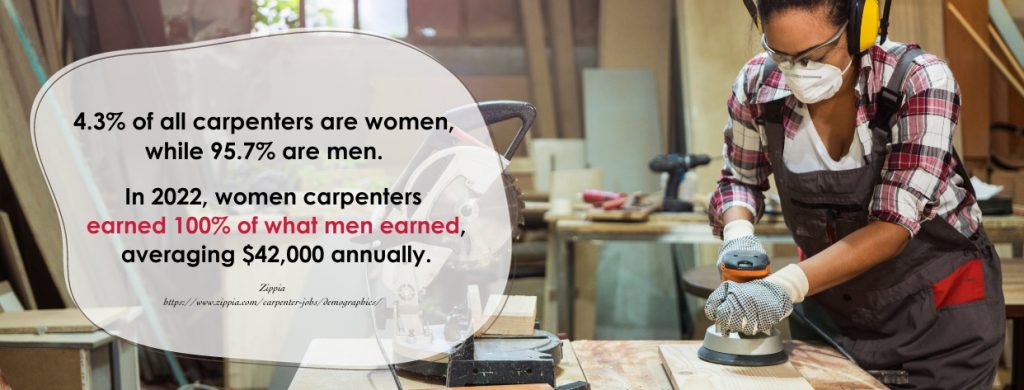Carpenters are among the most commonly skilled tradespeople in the construction industry. They play essential roles in residential and commercial construction projects, from erecting wooden building frameworks to finishing with aesthetic and functional doors, windows, and cabinets, among other interior elements.
Even when you have natural carpentry skills and experience, enrolling in traditional or online carpenter trade schools, as well as engaging in carpentry apprenticeship programs, can further upgrade your woodworking and other essential carpentry skills and allow you to explore various fields in carpentry that you could not have explored on your own.
What’s a Carpenter?
A skilled tradesperson, a carpenter constructs, installs, and repairs structures, fixtures, and furnishings using wood and related materials for residential and commercial use. Following construction drawings relating to the project, carpenters utilize various tools and techniques to shape and join wood for functional and aesthetic purposes.
Their roles and responsibilities include the following:
- Interpreting construction blueprints to understand the requirements and specifications of the project
- Estimating and procuring materials required for projects within a specific budget
- Preparing and assembling the structural wooden building frameworks
- Constructs the formwork for concrete construction projects
- Installing wooden doors, windows and frames and ensuring they fit correctly and function smoothly
- Installing wood flooring and other materials
- Providing finishing work like wooden trims, moldings, baseboards and other decorative elements
- Planning, building and installing cabinets, countertops and other custom storage solutions
- Maintaining, repairing and replacing damaged or deteriorating wooden structures or fixtures in existing buildings
- Ensuring that every job is conducted safely and in compliance with building codes and regulations
- Collaborating closely with other tradespersons like plumbers, electricians and painters
Recent US Labor Statistics data show that the median annual wage for carpenters as of 2022 was $51,390 per year. While the growth in employment opportunities within this trade is limited, the industry is projected to have an ongoing demand for approximately 79,500 carpenters each year over the next decade. These new carpenters will be needed to replace those who are retiring or transitioning to other careers.
Other occupations closely related to those of carpenters (and their median annual wage as of 2022, according to the Labor Occupational Outlook Handbook) include the following:
- Woodworkers, $37,590. Around 23,400 woodworkers are needed annually over the decade to replace those who exit the workforce.
- Roofers, $47,920. About 12,200 roofers are required in the next ten years.
- Flooring Installers, including wood flooring installers, $47,890. The industry is expected to hire an average of 9,800 flooring installers annually over the decade.
- Construction and Building Inspectors, $64,480. Despite declining employment growth, the industry still needs 15,700 inspectors annually in the next ten years.
- Construction Laborers and Helpers, $39,520. The job outlook from 2022 to 2032 looks promising at 4%, which is as fast as the average of all occupations.
Methodology
We have compiled a comprehensive list of trade schools and programs offering online Carpentry classes across the country. Our list includes a traditional, in-person program in carpentry, as online or blended programs in this trade are less common.
Each carpentry program included in our compilation adheres to the following specific criteria:
- Provides courses and training in online or hybrid formats to accommodate flexible scheduling options for students,
- Features a well-rounded curriculum that covers various aspects of carpentry, like woodworking and construction practices, and modern techniques like concrete work framing insulation,
- Prepares students for relevant certification examinations essential for establishing their careers in the carpentry field,
- Delivered by faculty members and staff who are industry experts with practical experience and qualifications directly relevant to carpentry,
- Offered by institutions with accreditation from agencies recognized by the Department of Education to ensure they meet high-quality education standards,
- Acknowledged and respected by well-established organizations within the carpentry and construction industry.
5 Top Online Carpentry Trade Schools
City College of San Francisco

- Location: San Francisco, California
- Online Delivery Method: Hybrid
- Time It Takes to Complete: 13 units (1 semester)
- Completion Rate: undisclosed
- Types of Aid: Free City (for San Francisco residents), California College Promise Grant (CCPG), Other Grants, Federal Work-Study program, Loans, Scholarships
City College of San Francisco offers a range of Construction Technology programs that are available fully or partially online. One of these is the Carpentry Certificate of Accomplishment program, which requires students to complete 13 units.
There are four required courses under the Carpentry program, namely:
- Blueprint Reading
- Carpentry – Rough Framing
- Construction Safety
- Introduction to Construction Applications
Students will also have to choose one of the following Elective courses:
- Adv. Project Furniture Making I
- Carpentry-Advanced Framing
- Concrete Applications
- Contractor License Preparation
- Finish Carpentry
- Furniture Making & Woodworking
The accreditation for City College of San Francisco has earned the nod of the Accrediting Commission for Community and Junior Colleges or ACCJC, Western Association of Schools and Colleges.
Fayetteville Technical Community College

- Location: Fayetteville, North Carolina
- Online Delivery Method: Hybrid
- Time It Takes to Complete: 3 semesters
- Completion Rate: undisclosed
- Types of Aid: Scholarships, Title IV Financial Aid, Veteran’s Services
The Carpentry Diploma program offered by Fayetteville Technical Community College (FTCC) will equip students with technical skills and knowledge to construct, install and repair wooden fixtures and structures. Students will also be prepared for entry-level carpentry careers in the fields of construction, construction management, architecture and other related professions.
The program requires students to complete 45 credits to obtain the Carpentry Diploma, with many of the courses available online. The courses include the following:
- Blueprint Reading
- Intro to Carpentry
- Carpentry I to III
- Planning/Estimating
Students will also have to complete the Freshman Composition (ENG 110) and Interpersonal Psychology (PSY 118) courses as well as a 3-unit Major Elective, which can be replaced with pre-approved Cooperative Education of up to three credit hours.
FTCC also provides carpentry students with hands-on, experiential learning by engaging in active projects like Habitat for Humanity houses. Furthermore, the school collaborates with many construction companies as part of its membership with the Home Builders Association of Fayetteville.
The Carpentry program covers the educational requirements for North Carolina’s General Contractor License.
Fayetteville Technical Community College meets the accreditation standards established by the Southern Association of Colleges and Schools Commission on Colleges or SACSCOC.
Sheridan College

- Location: Sheridan, Wyoming
- Online Delivery Method: Online
- Time It Takes to Complete: 24 credit hours
- Completion Rate: undisclosed
- Types of Aid: FAFSA, Scholarships, Grants, Student Loans, Childcare Assistance Grant
Sheridan College offers an online Carpentry Apprenticeship Certificate of Completion program, which is designed to prepare students to become journeyman carpenters and, ultimately, become licensed general contractors.
The apprenticeship program requires students to complete 24 credit hours in order to obtain the Certificate recognition. Aside from equipping students with technical carpentry knowledge and skills, the program also aims to provide students with the ability to communicate effectively in industry settings and apply mathematics in construction projects.
This program meets the educational requirements under the Sheridan area state-approved Carpentry Apprenticeship that qualifies students to sit for the journeyman’s exam.
The program accepts applicants who are working for a licensed contractor recognized by the Department of Labor Office of Apprenticeship in Cheyenne.
The Northern Wyoming Community College District (NWCCD), under which Sheridan College is a part, is accredited by the Higher Learning Commission or HLC.
Fox Valley Technical College

- Location: Oshkosh, Wisconsin
- Online Delivery Method: Hybrid
- Time It Takes to Complete: 37 credits (around three semesters)
- Completion Rate: undisclosed
- Types of Aid: FAFSA, Military Benefits, Grants, Loans, Federal Work-Study Program
Fox Valley Technical College offers a full-time Technical Diploma (TD) in Woodworking Technology program, which provides a foundation of valuable skills in this field of work. The curriculum is facilitated through a blended learning format that combines online and laboratory carpentry classes.
Students are required to complete 37 credits to obtain the Technical Diploma recognition, 33 of which are occupational-specific courses, and the rest are Occupational Supportive courses. The courses include:
- Blueprint Reading for the Woodworking Industry
- Drafting for the Woodworking Industry
- Frameless Cabinetry
- Furniture Exploration 1 and 2
- Layout and Sawing Operations
- Milling Operations
- Shaping and Molding
- Tool Design and Maintenance
Students are trained to build projects with their hands, power tools, and stationary woodworking equipment like computer numeric controls or CNC machines.
The program accepts High School graduates, GED certificate holders and Associate degree graduates.
Fox Valley Technical College maintains institutional accreditation from the HLC. It’s also recognized as an institution of higher education by the U.S. Department of Education and a comprehensive technical college by the Wisconsin Technical College System or WTCS Board.
Columbus State Community College

- Location: Columbus, Ohio
- Online Delivery Method: Onsite
- Time It Takes to Complete: 2 semesters
- Completion Rate: undisclosed
- Types of Aid: Customized Payment Plans, Third-Party Sponsors, FAFSA
Columbus State Community College offers a Construction Carpentry Certificate program exclusively to students actively engaged in apprenticeship programs formally acknowledged by the Ohio State Apprenticeship Council.
The program requires students to complete 19 credit hours spanning two semesters to obtain the Construction Carpentry Certificate. The curriculum covers the study of interior systems, concrete material, construction material science, scaffolding systems, and safety and loss prevention.
This Certificate program is delivered by the school’s Skilled Trades Department, which also offers the following carpentry programs:
- The Carpentry Module Certificate is a 13-credit Facilities Management program that focuses on equipping students with carpentry skills for the maintenance and repair of properties.
- ·The Carpenter Apprenticeship Readiness Certificate is a 26-credit program that prepares students for an apprenticeship position with one of the school’s apprenticeship partners.
The Higher Learning Commission has granted institutional accreditation to Columbus State Community College.
Carpentry Career Paths: More than Just Industrial Carpenters
While online Construction courses typically train students to become carpenters, the coursework generally provides students with a well-rounded education and diverse skill sets applicable to various roles and industries.
Custom Woodworkers/Cabinet Makers
Carpenters with artistic and woodworking skills can create custom furniture, cabinetry and woodcraft, among other decorative and functional structures and fixtures using a variety of building materials tools. They can also run their own woodworking businesses or work for specialized woodworking shops.
Furniture Restoration Specialists
Carpenters with an interest in restoration can work on repairing and restoring antique furniture pieces.
Renovation Contractors
Carpenters can specialize in home renovations to offer kitchen and bathroom remodeling, basement finishing, and home additions, among other services.
Home Inspectors
Carpenters can become home inspectors who examine residential construction properties for structural issues, safety concerns, and compliance with building and zoning codes.
Estimators
Carpenters with strong math and organizational skills can work as estimators who calculate project costs, materials, and labor requirements for construction companies.
Safety Inspectors
Carpenters with thorough knowledge of construction site safety can become inspectors who will ensure compliance with safety regulations and standards on work sites.
Project Managers
Carpenters who have project management skills can apply for project manager roles dealing with planning, coordinating, and overseeing construction projects.
Construction Supervisors/Foremen
Experienced carpenters can advance to supervisory roles with the responsibility of overseeing construction projects, managing teams of workers, and ensuring projects are completed on time and within budget.
Construction Trades Instructors
Experienced carpenters can give back to society by becoming educators who teach carpentry skills at vocational schools, community colleges, or apprenticeship programs.
Energy Auditors
Some carpentry programs include courses on energy efficiency and sustainability, allowing graduates the chance to venture into the career of conducting energy audits and retrofitting buildings with eco-friendly features.
Real Estate Developers
Experienced carpenters with an entrepreneurial spirit may venture into real estate development and lead their own construction projects.

Frequently Asked Questions about Online Carpentry Trade Schools
Can I complete a Carpentry Trade Program entirely online, or is it a hybrid format?
Most carpentry trade programs are offered in a hybrid format. Due to the hands-on nature of the trade, a fully online program for Carpentry may be limited. Carpentry involves practical skills like woodworking, framing, and construction techniques and may involve using specialized tools and stationary equipment, which are best learned through hands-on experience in workshops.
A hybrid carpentry program generally involves completing theoretical coursework online but requires in-person attendance in sessions or labs for practical training and assessments. Some programs may also arrange for local internships or apprenticeships where students can gain practical experience with local employers.
In essence, the hybrid format allows you to gain the necessary hands-on skills while still enjoying the flexibility of online learning for theory and coursework.
What are the admission requirements for online Carpentry Trade programs?
Admission requirements vary by institution for online Carpentry Trade programs, but common prerequisites include a high school diploma or equivalent and, in some cases, a minimum GPA. Some programs also accept Associate degree holders and currently employed skilled tradespersons looking to level up their carpentry skills or seeking eligibility to sit in general contractor license exams.
Some programs also require applicants to submit standardized test scores or demonstrate proficiency in math and English.
Additionally, applicants are typically asked to provide letters of recommendation and a personal statement or undergo an interview process.
Students are highly advised to check the specific admission requirements of the school or program they’re interested in to ensure they meet all criteria.
Can students transfer credits earned in an online Carpentry Trade program to a higher degree program later on?
Transferring credits from an online Carpentry Trade program to a higher degree program depends on several factors, including the policies of the receiving academic institution and the specific courses you’ve completed.
Some colleges and universities may accept transfer credits earned in a Carpentry Trade program toward a related degree program like construction management, facilities management, architectural technology, or building construction technology.
It’s advisable to check with the institution you plan to transfer to and inquire about their credit transfer policies to determine if your Carpentry Trade program credits are transferable.
Summary Points
- Having formal education through Carpentry Diploma or Certificate programs, even if you’re an experienced carpenter with raw skills, offers various benefits like upgrading your carpentry capabilities, exploring different aspects of carpentry, and most importantly, preparing for a general contractor license examination.
- The curriculum covered in Carpentry Trade programs may differ among institutions, and thus, students are highly advised to research the program’s learning outcomes or contact the program advisor for more information.
- Despite the limited growth expected in the employment of carpenters within the next decade, the industry will still need thousands of new carpenters each year in order to cover for existing tradespersons who’ll be retiring or changing careers.
For more valuable information, see the following:

